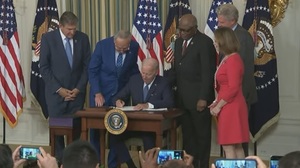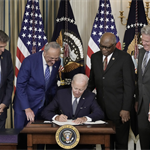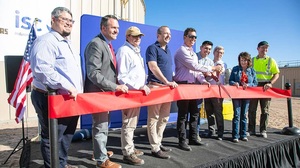Biden signs new SAF, hydrogen, clean fuel tax credits into law
Energy Disrupter
ADVERTISEMENT
President Joe Biden on Aug. 16 signed the Inflation Reduction Act into law, calling the legislation the “biggest step forward in climate—ever” and stressing it will allow the U.S. to boldly take addition steps towards meeting its climate goals.
The expansive legislative package addresses a wide range of issues, including inflation reduction, domestic energy production and manufacturing, carbon emissions reductions, Medicare and health care costs, and tax loopholes.
Of interest to the biofuel and bioenergy industries, the newly signed law establishes new tax credits for sustainable aviation fuel (SAF), clean transportation fuels and clean hydrogen. It also extends several existing tax credits that benefit transportation biofuels, such as renewable diesel and biodiesel, and includes funding for biofuel infrastructure development. Other provisions of the bill support the production of biogas- and biomass-based electricity and offer tax incentives for homeowners to install biomass-fired residential heating appliances. The bill also extends and expands the Section 45Q tax credit for carbon capture and storage (CCS).
The new SAF tax credit starts at $1.25 per gallon for SAF that achieves a 50 percent greenhouse gas (GHG) reduction when compared to a baseline fossil fuel. An additional 1 cent per gallon is available for each percentage point by which the lifecycle GHG emission reduction of the fuel exceeds 50 percent. The tax credit is capped at $1.75 per gallon. The new also establishes a competitive grant program in support of alternative aviation fuels and low-emission aviation technologies. In part, the program would provide grants to eligible entities to carry out projects located in the U.S. that produce, transport, blend or store SAF. Nearly $250 million in funding would be available to support SAF projects under the program.
The newly established Clean Fuel Production Tax Credit is a technology-neutral tax credit that aims to support the production of low-emissions transportation fuel. It will apply to transportation fuel produced and sold in 2025, 2026 and 2027. To qualify, the fuel will have to achieve a GHG reduction of approximately 40 percent when compared to diesel and meet other requirements.
The new law also establishes a Section 45V production tax credit (PTC) for clean hydrogen produced at qualified facilities that begin construction before the end of 2032. The credit will apply to hydrogen produced after the end of 2022. Depending on the specific project, the credit could range from 12 cents per kilogram to $3 per kilogram, according to the bill text.
The Inflation Reduction Act also extends several existing bioenergy and biofuel tax credits. The $1 per gallon blends tax credit for biodiesel and renewable diesel is extended through the end of 2024. It also extends the 50-cent per gallon alternative fuels tax credit, the second-generation biofuel income tax credit, and the alternative fuel vehicle refueling property credit.
In addition, it appropriates $500 million to support the development of biofuel infrastructure, including infrastructure improvements for blending, storing, supplying or distributing biofuels; installing, retrofitting or upgrading fuel dispensers to supply higher blends of biofuels; and for building and retrofitting home heating oil distribution centers to supply biofuels. The new law also includes an estimated $18 billion in support of climate-smart agriculture, which will benefit biofuel producers through the production of lower-carbon feedstocks.
For renewable electricity, the Inflation Reduction At extends the Section 45 production tax credit (PTC), which benefits qualified biogas, open-loop biomass and closed-loop biomass facilities, to qualified facilities that begin construction before Jan. 1, 2025. For home heating, the it extends and modifies of the Section 25 tax credit, which, in part, supports the installation residential biomass-fired stove and boilers. The tax credit for these residential appliances is capped at $2,000.
The Inflation Reduction Act supports CCS projects through an extension and modification of the Section 45Q tax credit. It extends the Section 45Q tax credit to any carbon capture, direct air capture or carbon utilization project that begins construction before Jan. 1, 2033. It also increases the value of the credit for industrial facilities and power plants that capture their carbon emissions to $85 per metric ton of CO2 stored in secure geologic formations, $60 per ton for the beneficial utilization of captured carbon emissions, and $60 per ton for CO2 stored in oil and gas fields. For direct air capture technologies, the credit is increased to $180 per metric ton for projects that store captured CO2 in secure geologic formations, $130 per ton for carbon utilization, and $130 per ton for CO2 stored in oil and gas fields.
The Coalition for Renewable Natural Gas is thanking Biden for signing the Inflation Reduction Act, noting the new law includes notable policy changes that will incentivize the use of renewable natural gas (RNG). The RNG industry will specifically benefit through the inclusion of biogas property as qualifying property under the Section 48 tax credit, the extension of the 50 cent per gallon alternative fuel tax credit; the newly clean hydrogen tax credit that allow for the use of RNG as a qualifying feedstock, and the expansion of the Section 45Q tax credit for CCS.
“Capturing biogas and converting methane from society’s waste streams into renewable natural gas (RNG) is a no-regrets solution helping to combat climate change by reducing greenhouse gas emissions and decarbonizing our existing energy infrastructure,” said Johannes Escudero, founder and CEO of the Coalition for Renewable Natural Gas. “The clean energy tax incentives in the Inflation Reduction Act of 2022 will help advance our mission and enable the nation to realize the climate, energy and economic benefits associated with RNG.”
The Renewable Fuels Association said the Inflation Reduction Act will support growth and investment in the use of low-carbon fuels, including ethanol. The ethanol industry will benefit from the $500 million in grants for higher-blend biofuels infrastructure, the extension of several current biofuel tax credits, the new tax credits for clean fuels and SAF, and enhanced support for CCS.
“We thank President Biden for signing the budget reconciliation bill today and recognizing that low-carbon, lower-cost renewable fuels like ethanol are a critical tool for combatting climate change,” Geoff Cooper, president and CEO of the RFA. “This bill puts ethanol on a sustainable path for growth and investment. Several provisions within this bill are very important to the U.S. biofuels industry and will result in American families having greater access to low-carbon, more affordable, domestically made renewable fuels. We look forward to helping the administration implement the key provisions within this legislation.”
The American Coalition for Ethanol said the Inflation Reduction Act confirms the role farmer and biofuel producers can pay in reducing GHG emissions. “This sweeping legislation recognizes the role farmers and biofuel producers can play in reducing greenhouse gas emissions and validates the work ACE has put forth to position corn ethanol as a meaningful part of the climate solution,” said Brian Jennings, CEO of ACE. “Record-level investments in biofuel infrastructure, climate-smart agriculture practices, carbon capture and sequestration projects, and low carbon intensity fuels available now and in the future will help grow ethanol demand long term.
“The legislation helps assure farmers and ethanol producers they can earn a return on the investments they make to innovate and help reduce greenhouse gas emissions.”
The Carbon Capture Coalition is calling the Inflation Reduction Act a historic moment for carbon management. “Today marks a historic moment for carbon management as the enactment of the Inflation Reduction Act reinforces the essential role these technologies will play in our nation’s broader climate strategy and solidifies America’s domestic energy, industrial and manufacturing sectors as leading the way to a decarbonized global economy,” said Madelyn Morrison, external affairs manager for the Carbon Capture Coalition. “The critical enhancements to the federal Section 45Q tax credit contained in the law, all of which were advocated for by the Carbon Capture Coalition, further incentivize economywide deployment of carbon management projects by providing investment certainty, additional credit value and the flexibility needed to drive greater private investment across multiple sectors. These incentives are critical to the continued growth and development of the carbon management industry and their enactment into law is yet another indication of the vital role they will play in climate and energy policy in the decades ahead.
“The Carbon Capture Coalition applauds the enactment of these enhancements, which will be instrumental in scaling the carbon management industry at the rate necessary to achieve midcentury climate targets, while retaining and creating family-sustaining jobs and safeguarding America’s domestic energy production,” Morrison continued. “We will continue to work closely with our federal and external partners to ensure that these groundbreaking policies work as efficiently and effectively as intended.”
















